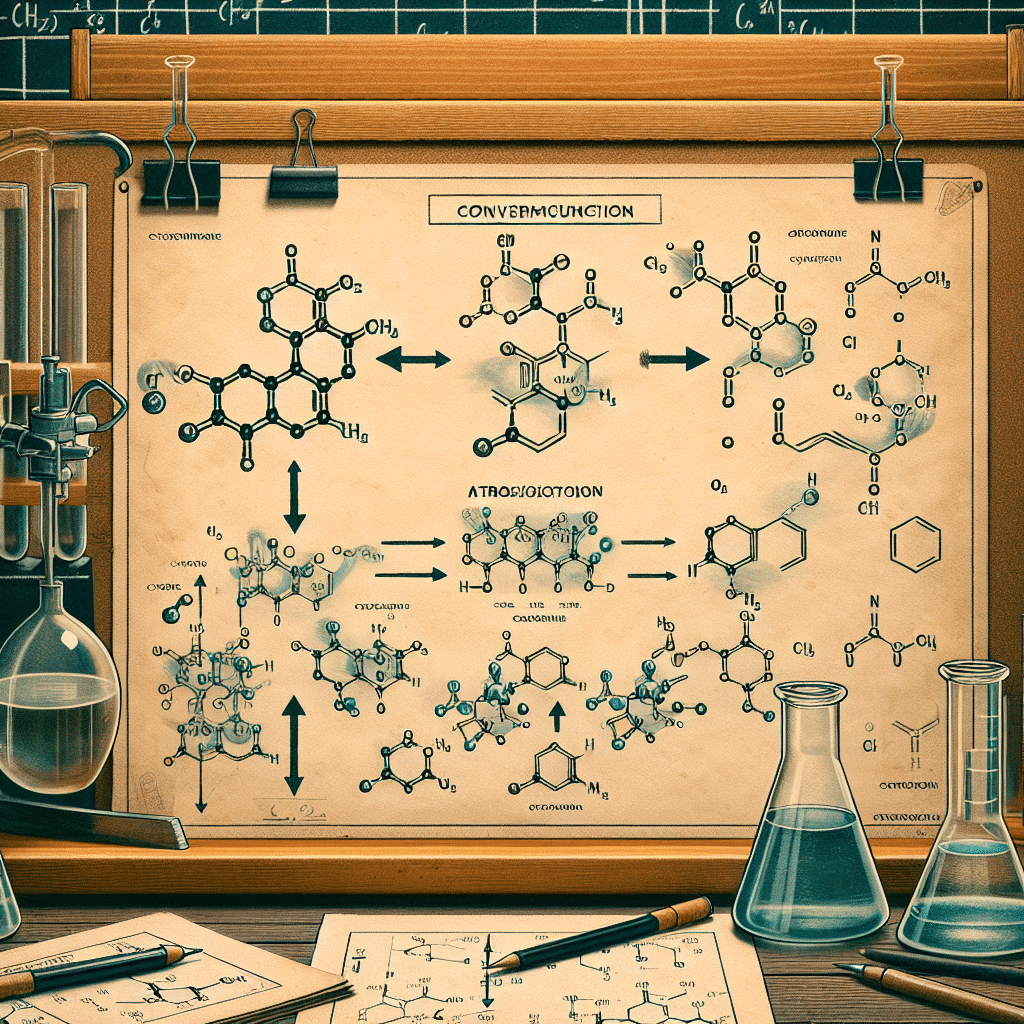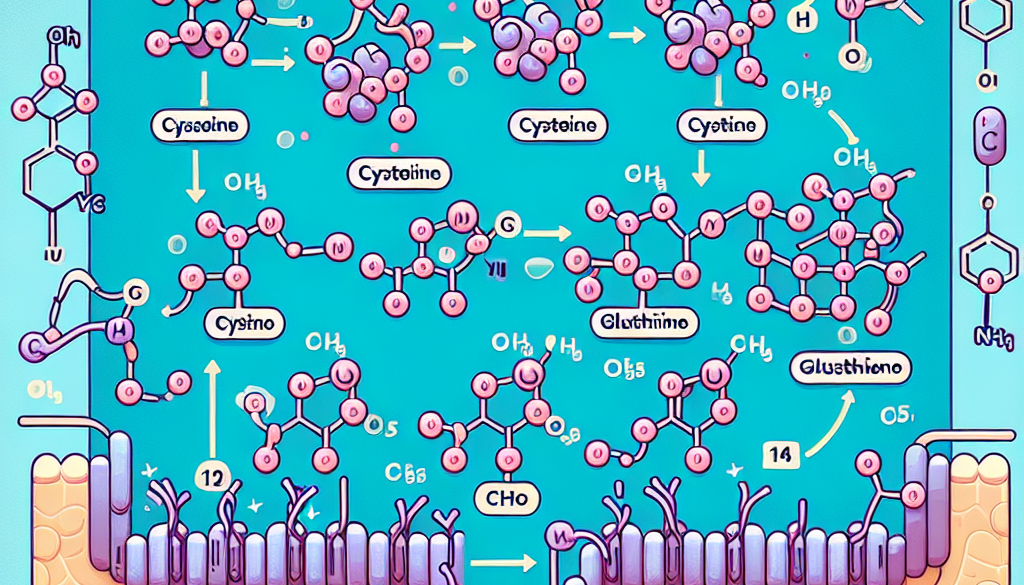Cysteine to Glutathione: Conversion Process
-
Table of Contents
- Unlocking the Power of Antioxidants: Cysteine to Glutathione Conversion
- Understanding Glutathione and Its Importance
- The Role of Cysteine in Glutathione Synthesis
- The Biochemical Pathway from Cysteine to Glutathione
- Factors Influencing Glutathione Synthesis
- Boosting Glutathione Levels: Dietary and Supplemental Interventions
- Research and Case Studies on Glutathione Enhancement
- Conclusion: The Significance of Cysteine to Glutathione Conversion
- Enhance Your Health with ETprotein’s Protein Products
Unlocking the Power of Antioxidants: Cysteine to Glutathione Conversion

Glutathione, often referred to as the “master antioxidant,” plays a crucial role in maintaining cellular health and preventing oxidative stress. The conversion of cysteine to glutathione is a complex biological process that is vital for life. This article delves into the intricacies of this conversion, exploring the mechanisms, benefits, and implications for human health.
Understanding Glutathione and Its Importance
Glutathione is a tripeptide composed of three amino acids: cysteine, glutamate, and glycine. It is found in virtually every cell of the human body and is essential for a variety of biological functions, including:
- Neutralizing harmful free radicals and reactive oxygen species
- Regulating cell proliferation and apoptosis
- Detoxifying xenobiotics and carcinogens
- Supporting immune function
- Assisting in the metabolism of fats, proteins, and DNA synthesis
Given its wide range of functions, maintaining optimal glutathione levels is critical for overall health and well-being.
The Role of Cysteine in Glutathione Synthesis
Cysteine is a sulfur-containing amino acid that is a key component in the synthesis of glutathione. It is often considered the rate-limiting step in glutathione production because it is typically the least abundant of the three constituent amino acids. The body acquires cysteine through diet, with high-protein foods like meat, eggs, and dairy products being excellent sources. Additionally, the body can synthesize cysteine from the amino acid methionine through a series of biochemical reactions.
The Biochemical Pathway from Cysteine to Glutathione
The conversion of cysteine to glutathione occurs through a two-step enzymatic process known as the gamma-glutamyl cycle:
- First Step: The enzyme gamma-glutamylcysteine synthetase catalyzes the formation of gamma-glutamylcysteine from cysteine and glutamate.
- Second Step: Glutathione synthetase then adds glycine to gamma-glutamylcysteine to form glutathione.
This process is tightly regulated within the body to ensure that glutathione is synthesized according to cellular demand.
Factors Influencing Glutathione Synthesis
Several factors can affect the body’s ability to produce glutathione:
- Diet: Adequate intake of cysteine-rich foods is essential for glutathione synthesis.
- Age: Glutathione levels naturally decline with age, reducing the body’s antioxidant defenses.
- Health Status: Chronic diseases, stress, and inflammation can deplete glutathione levels.
- Environmental Toxins: Exposure to pollutants and toxins can increase the demand for glutathione.
- Genetics: Genetic variations can affect the activity of enzymes involved in glutathione synthesis.
Understanding these factors is crucial for developing strategies to maintain or enhance glutathione levels in the body.
Boosting Glutathione Levels: Dietary and Supplemental Interventions
There are several ways to boost glutathione levels in the body:
- Dietary Changes: Consuming foods rich in sulfur-containing amino acids, such as cysteine and methionine, can support glutathione synthesis.
- Supplements: N-acetylcysteine (NAC) is a supplement form of cysteine that has been shown to increase glutathione levels.
- Glutathione Precursors: Supplements like alpha-lipoic acid and S-adenosylmethionine (SAMe) can also support glutathione production.
- Lifestyle Modifications: Regular exercise, adequate sleep, and stress reduction can positively influence glutathione levels.
It’s important to consult with a healthcare professional before starting any supplementation regimen to boost glutathione levels.
Research and Case Studies on Glutathione Enhancement
Several studies have highlighted the benefits of increasing glutathione levels:
- A study published in the European Respiratory Journal found that NAC supplementation improved lung function in patients with chronic obstructive pulmonary disease (COPD).
- Research in the Journal of Applied Physiology showed that exercise increased glutathione levels and improved antioxidant capacity in older adults.
- A clinical trial reported in the Journal of Clinical Epidemiology demonstrated that glutathione levels were inversely associated with the risk of heart disease.
These examples underscore the potential of targeting glutathine synthesis for therapeutic benefits.
Conclusion: The Significance of Cysteine to Glutathione Conversion
The conversion of cysteine to glutathione is a fundamental biological process with significant implications for health and disease prevention. By understanding the factors that influence this conversion and implementing strategies to enhance glutathione levels, individuals can potentially improve their antioxidant defenses and overall health. As research continues to uncover the benefits of glutathione, the importance of maintaining adequate levels of this critical molecule becomes increasingly clear.
Enhance Your Health with ETprotein’s Protein Products
If you’re looking to support your body’s production of glutathione, consider incorporating high-quality protein products from ETprotein into your diet. ETprotein offers a range of organic, non-GMO, allergen-free protein powders that can provide the amino acids necessary for optimal glutathione synthesis. Their products, including rice protein, pea protein, and various seed proteins, are an excellent addition to any health-conscious individual’s nutritional regimen.
About ETprotein:
ETprotein, a reputable protein and L-(+)-Ergothioneine (EGT) Chinese factory manufacturer and supplier, is renowned for producing, stocking, exporting, and delivering the highest quality organic bulk vegan proteins and L-(+)-Ergothioneine. They include Organic rice protein, clear rice protein, pea protein, clear pea protein, watermelon seed protein, pumpkin seed protein, sunflower seed protein, mung bean protein, peanut protein, and L-(+)-Ergothioneine EGT Pharmaceutical grade, L-(+)-Ergothioneine EGT food grade, L-(+)-Ergothioneine EGT cosmetic grade, L-(+)-Ergothioneine EGT reference grade and L-(+)-Ergothioneine EGT standard. Their offerings, characterized by a neutral taste, non-GMO, allergen-free attributes, with L-(+)-Ergothioneine purity over 98%, 99%, cater to a diverse range of industries. They serve nutraceutical, pharmaceutical, cosmeceutical, veterinary, as well as food and beverage finished product distributors, traders, and manufacturers across Europe, USA, Canada, Australia, Thailand, Japan, Korea, Brazil, and Chile, among others.
ETprotein specialization includes exporting and delivering tailor-made protein powder and finished nutritional supplements. Their extensive product range covers sectors like Food and Beverage, Sports Nutrition, Weight Management, Dietary Supplements, Health and Wellness Products, and Infant Formula, ensuring comprehensive solutions to meet all your protein needs.
As a trusted company by leading global food and beverage brands and Fortune 500 companies, ETprotein reinforces China’s reputation in the global arena. For more information or to sample their products, please contact them and email sales(at)ETprotein.com today.












